Serving 372 students in grades Prekindergarten-5, Education Franz Elementary School ranks in the bottom 50% of all schools in Texas for overall test scores (math proficiency is bottom 50%, and reading proficiency is bottom 50%).
The percentage of students achieving proficiency in math is 30-34% (which is lower than the Texas state average of 41%). The percentage of students achieving proficiency in reading/language arts is 45-49% (which is lower than the Texas state average of 51%).
The student:teacher ratio of 14:1 is equal to the Texas state level of 14:1.
Minority enrollment is 84% of the student body (majority Hispanic), which is higher than the Texas state average of 75% (majority Hispanic).
Quick Stats (2025)
- Grades: Prekindergarten-5
- Enrollment: 372 students
- Student:Teacher Ratio: 14:1
- Minority Enrollment: 84%
- Overall Testing Rank: Bottom 50% in TX
- Math Proficiency: 30-34% (Btm 50%)
- Reading Proficiency: 45-49% (Btm 50%)
- Science Proficiency: 20-29% (Btm 50%)
- Source: National Center for Education Statistics (NCES), TX Dept. of Education
Top Rankings
Education Franz Elementary School ranks among the top 20% of public schools in Texas for:
Category
Attribute
Most improved public schools
School Overview
Education Franz Elementary School's student population of 372 students has declined by 8% over five school years.
The teacher population of 26 teachers has declined by 13% over five school years.
Grades Offered
Grades Prekindergarten-5
Total Students
372 students
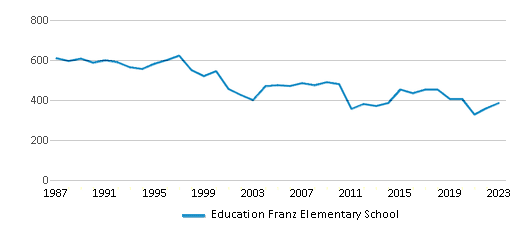
Gender %
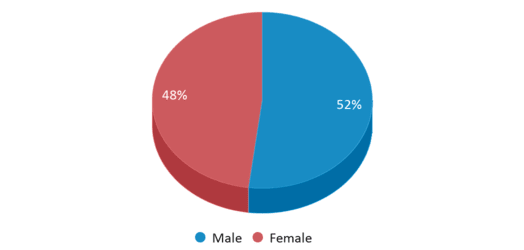
Total Classroom Teachers
26 teachers
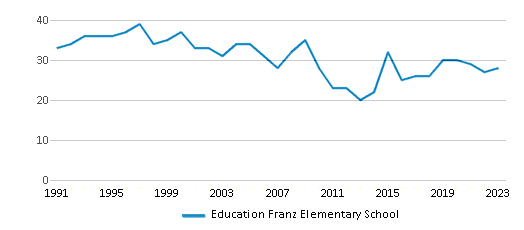
Students by Grade
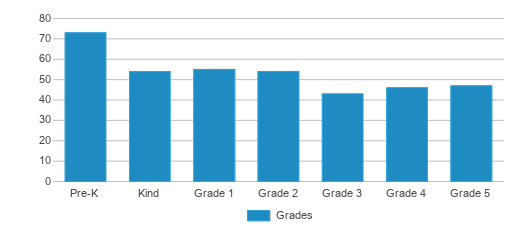
School Rankings
Education Franz Elementary School ranks within the bottom 50% of all 8,188 schools in Texas (based off of combined math and reading proficiency testing data).
The diversity score of Education Franz Elementary School is 0.54, which is less than the diversity score at state average of 0.64. The school's diversity has stayed relatively flat over five school years.
Overall Testing Rank
#4913 out of 8188 schools
(Bottom 50%)
(Bottom 50%)
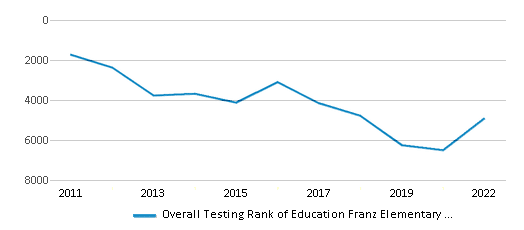
Math Test Scores (% Proficient)
30-34%
41%
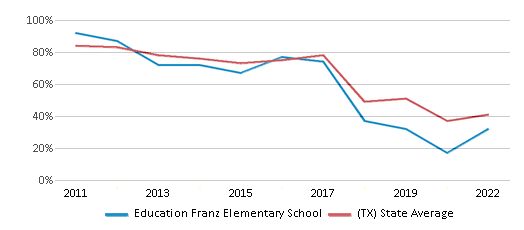
Reading/Language Arts Test Scores (% Proficient)
45-49%
51%
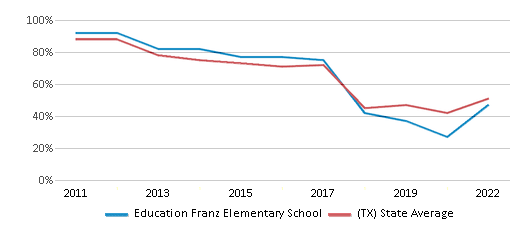
Science Test Scores (% Proficient)
20-29%
46%
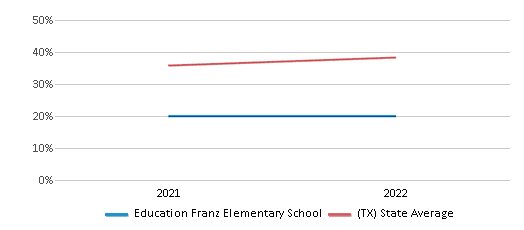
Student : Teacher Ratio
14:1
14:1
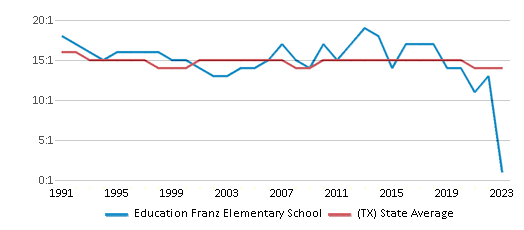
American Indian
n/a
n/a
Asian
n/a
6%
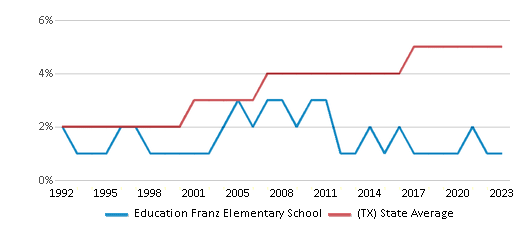
Hispanic
65%
53%
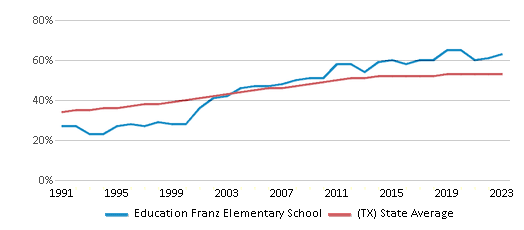
Black
13%
13%
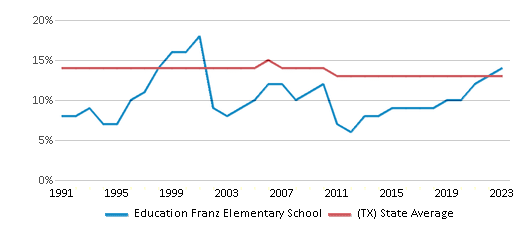
White
16%
25%
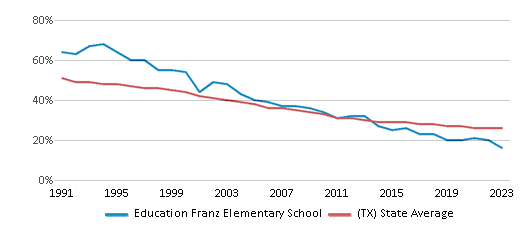
Hawaiian
1%
n/a
Two or more races
5%
3%
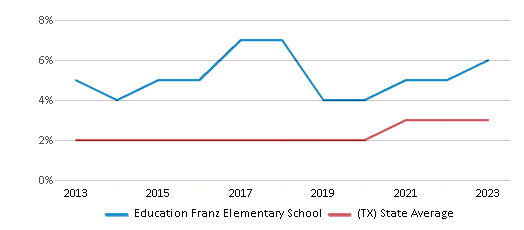
All Ethnic Groups
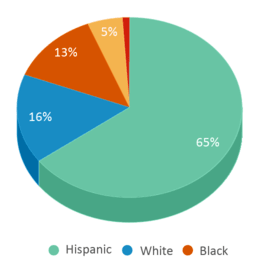
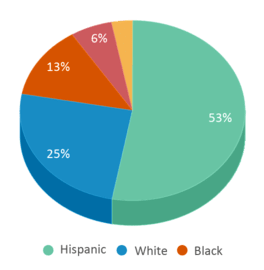
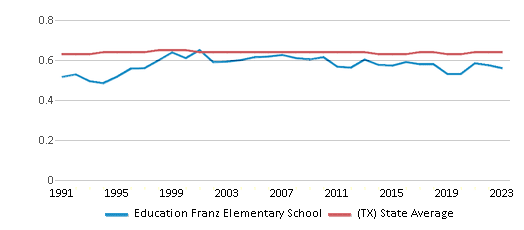
Participates in the National School Lunch Program (NSLP)
Yes
Eligible for Free Lunch
75%
57%
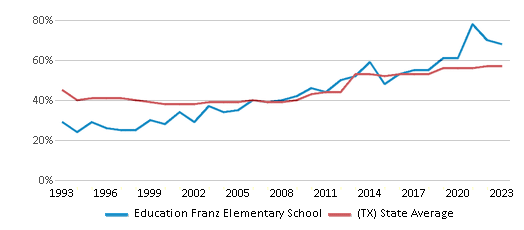
Eligible for Reduced Lunch
5%
5%
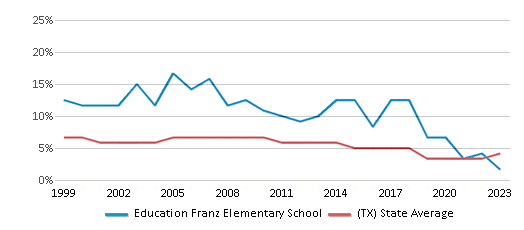
School Statewide Testing
School District Name
Source: National Center for Education Statistics (NCES), TX Dept. of Education
Profile last updated: 02/09/2025
Frequently Asked Questions
What is Education Franz Elementary School's ranking?
Education Franz Elementary School is ranked #4913 out of 8,188 schools, which ranks it among the bottom 50% of public schools in Texas.
What percent of students have achieved state testing proficiency in math and reading?
30-34% of students have achieved math proficiency (compared to the 41% TX state average), while 45-49% of students have achieved reading proficiency (compared to the 51% TX state average).
How many students attend Education Franz Elementary School?
372 students attend Education Franz Elementary School.
What is the racial composition of the student body?
65% of Education Franz Elementary School students are Hispanic, 16% of students are White, 13% of students are Black, 5% of students are Two or more races, and 1% of students are Hawaiian.
What is the student:teacher ratio of Education Franz Elementary School?
Education Franz Elementary School has a student ration of 14:1, which is equal to the Texas state average of 14:1.
What grades does Education Franz Elementary School offer ?
Education Franz Elementary School offers enrollment in grades Prekindergarten-5
What school district is Education Franz Elementary School part of?
Education Franz Elementary School is part of Judson Independent School District.
In what neighborhood is Education Franz Elementary School located?
Education Franz Elementary School is located in the Northeast Side neighborhood of San Antonio, TX. There are 30 other public schools located in Northeast Side.
School Reviews
5 3/23/2020
It's a Great School, the teachers and the staff are so professional, my daughter, she starts a regular classroom in this school and she learns a lot, she always goes to Special Needs Class for her condition Autism and she starts In regular class in this school and she, right now, it's a good student. The teachers work to the students excellent. The Office Staff, the Principal, the Counselor, the Special Needs educator, the Teachers, all Custodian, the Coach, everybody to work here are professional.
2 5/16/2011
This school doesn't have any clubs from what I've seen on their school website. There is despererate need for parent participation. there is no activities for students not even in the early morrning. I wouldn't recomend this school to anyone.
Review Education Franz Elementary School. Reviews should be a few sentences in length. Please include any comments on:
- Quality of academic programs, teachers, and facilities
- Availability of music, art, sports and other extracurricular activities
Recent Articles

What Is A Charter School?
Explore the world of charter schools in this comprehensive guide. Learn about their history, how they operate, and the pros and cons of this educational innovation. Discover key facts about charter schools, including admission policies, demographics, and funding, as well as what to look for when considering a charter school for your child.

10 Reasons Why High School Sports Benefit Students
Discover the 10 compelling reasons why high school sports are beneficial for students. This comprehensive article explores how athletics enhance academic performance, foster personal growth, and develop crucial life skills. From improved fitness and time management to leadership development and community representation, learn why participating in high school sports can be a game-changer for students' overall success and well-being.

February 05, 2025
Understanding the U.S. Department of Education: Structure, Impact, and EvolutionWe explore how the Department of Education shapes American education, from its cabinet-level leadership to its impact on millions of students, written for general audiences seeking clarity on this vital institution.







